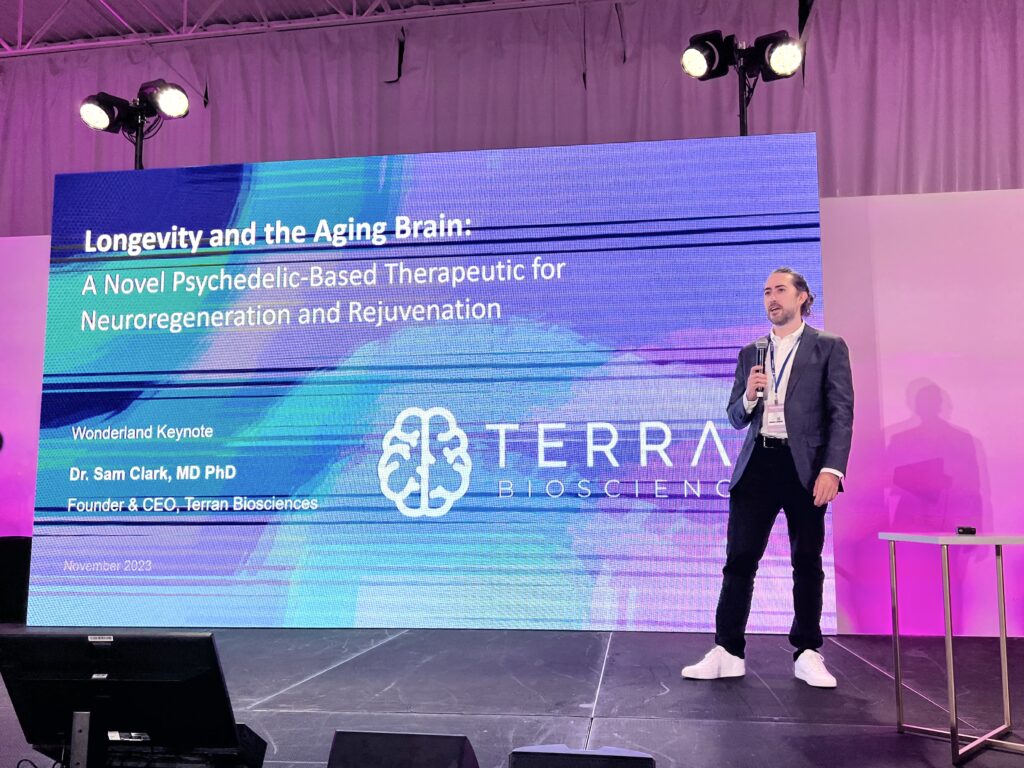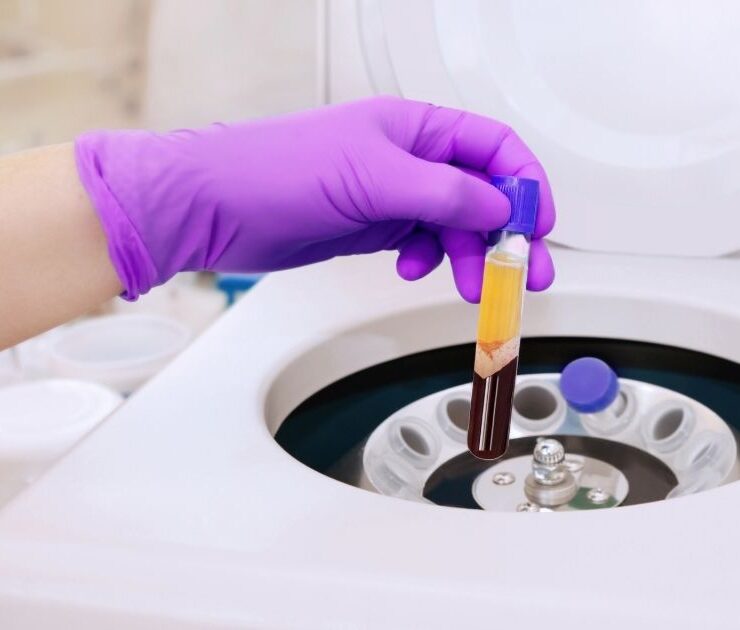Plant-based Medicine: Terran’s Breakthrough in Neurological and Psychiatric Healing
Reed Berglund is a passionate advocate for wellness and an…
As someone deeply immersed in the health and wellness industry, I’m continually astounded by the talent in Miami, especially after my conversation with Dr. Sam Clark, CEO of Terran Biosciences, at the Wonderland Conference. This city, now a hub for entrepreneur’s like Sam, is shaping the future of healthcare innovation. Dr. Clark’s background is impressive: over 200 patent applications, advanced degrees from Columbia University, and a BS from MIT. Terran, with a team boasting expertise from renowned institutions like Yale and Harvard, is redefining neuropsychiatric therapeutics.
Terran Biosciences’ approach is refreshingly distinct from traditional big pharma. They operate with a lean, startup-like agility, focusing on a small core team that expands with expert teams for specific projects. This decentralized, horizontal structure contrasts sharply with the slow-moving, hierarchical nature of conventional pharmaceutical companies. This strategy allows Terran to rapidly advance innovative treatments, as exemplified by their work related to Schizophrenia and Parkinson’s. Sam’s vision and Terran’s nimble structure exemplify the dynamic possibilities in modern drug development.
Innovation Led to Plant-based Medicine

Initially not focused on psychedelics, they targeted a 90s schizophrenia drug with potential as an effective adjunctive therapy. Its main challenge was the frequent dosing requirement. Demonstrating their agile approach, Terran secured global rights to the drug, assembled a world-class team, and successfully reformulated it for once-daily dosing. This project, as Sam recounted, marked a significant stride in addressing unmet needs in mental health care using Terran’s unique approach.
Continuing from Terran’s success with a once-daily schizophrenia treatment, they turned their energy to Parkinson’s disease. This topic hits close to home for me, having witnessed my father’s long battle with Parkinson’s. Despite longstanding calls by doctors to standardize a particular biomarker for Parkinson’s, no one had managed to automate its measurement.
The Terran team discovered that a group of scientists at Columbia had solved the problem but it was still an academic invention. Rapidly, Terran licensed the technology from Columbia University to develop a cloud-based system capable of analyzing MRIs from any hospital worldwide. This development, which received FDA clearance, is a historic first for the biomarker, neuromelanin, in Parkinson’s and aging.
Breakthroughs in Neurological and Psychiatric Treatment
During the time of Terran’s initial projects, Dr. Clark and the team began exploring psychedelics, recognizing their potential as rapid antidepressants and their ability to regenerate neurons in the adult brain. However, the ‘trip’ experience associated with psychedelics posed a significant barrier. Terran overcame this by partnering with Spanish labs to develop a method that retains the therapeutic benefits while eliminating the ‘trip’. This involves selectively blocking the serotonin 2A receptor, allowing other beneficial receptors to be activated by psychedelics like DMT.
From my perspective, as someone who’s not a neuroscientist but is fascinated by how the body responds to different stimuli, the serotonin 2A receptor is quite intriguing. It’s a protein in the brain that responds to serotonin, a key neurotransmitter. What is a neurotransmitter you ask? It is essentially a chemical messenger in your body. It’s like a tiny courier that travels between nerve cells in your brain and other parts of your body, carrying signals or messages. These messages help regulate everything from our emotions and mood to muscle movement and heart rate. Neurotransmitters play a crucial role in how we feel, think, and function daily.
In summary, the 2a receptor plays a significant role in various psychological and physiological processes. When psychedelics like DMT interact with this receptor, they can produce the ‘trip’ experience. Understanding and targeting this receptor is crucial in Terran’s work to harness the therapeutic benefits of psychedelics while minimizing unwanted hallucinogenic effects. This breakthrough aims to broaden the therapeutic use of psychedelics in mental health care.
The Future of Plant-Based Medicine Therapies
Terran’s mission, described by Sam, goes beyond just treating neurological and psychiatric conditions; it’s about halting neurodegeneration and enhancing life’s quality. As Sam emphasized, “Imagine having better memory, being more active, and not degenerating as fast, even if you don’t live longer.” In exploring Terran Biosciences’ work, understanding aging’s impact on the brain has been a key focus. Normal aging brings changes in cognitive abilities and brain structure.
While some skills like reasoning and vocabulary might remain stable or improve, overall brain volume tends to decline, and cognitive functions can slow down. This backdrop of natural aging processes emphasizes the importance and potential impact of Sam Clark’s work in addressing neurodegeneration. It highlights the need for comprehensive approaches to maintain brain health, including a balanced diet, regular exercise, and mental engagement.
As we age, our brains undergo changes that can predispose us to various mental health conditions. Stress, especially chronic stress like the fight-or-flight response, can accelerate these changes. Terran’s innovative approach to mental health treatment, particularly for conditions like depression, PTSD, and anxiety, involves modulating brain responses without inducing psychedelic experiences. This method could be vital in addressing the mental health implications of aging and chronic stress, offering a more balanced, less intrusive form of therapy.
Conclusion
Discussing with Sam Clark, it’s clear that the landscape of plant-based medicine is rapidly evolving. Traditional psychedelic experiences like psilocybin and ayahuasca journeys are giving way to innovative approaches like Terran’s, which focus on synthetic alternatives to remove the hallucinatory aspect. This is a critical time, as laws and policies shift towards more acceptance of psychedelics for mental health treatments, mirroring the journey of medical cannabis. These changes, however, raise significant questions for federal health agencies and the broader healthcare community, especially regarding the treatment of veterans and the role of psychedelics outside clinical trials.
Reed Berglund is a passionate advocate for wellness and an embodiment of the active lifestyle. As a former college athlete who played basketball for the UNLV Running Rebels, he's lived a life deeply immersed in body movement and sports. Reed's enthusiasm for staying active extends far beyond the basketball court. He's an avid surfer, wakeboarder, skier, basketball and tennis enthusiast, and an emerging padel player. His love for holistic well-being also includes a dedication to cold plunges and contrast therapy, embracing these practices to optimize recovery and vitality. In his role as the founder of Breathe, Reed brings his extensive experience in wellness and his unwavering commitment to helping individuals discover their path to a healthier, more mindful life. His personal journey and multifaceted fitness background inspire his vision for Breathe as a platform that empowers urban dwellers to explore, experience, and embrace well-being in all its forms. Reed's current focus lies in the realm of flexibility, a key component in his fitness journey to extend the longevity of his active lifestyle. Through Breathe, he aims to share his passion, knowledge, and insights with a vibrant community of wellness enthusiasts, experts, and storytellers, collectively working toward a healthier and happier world.







